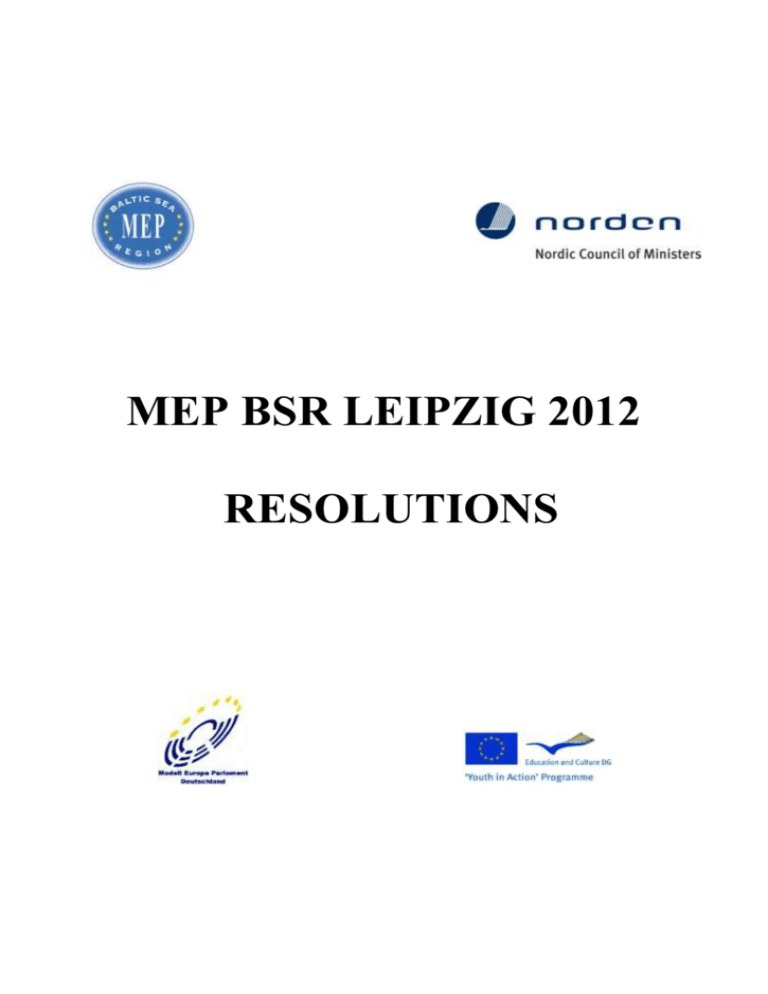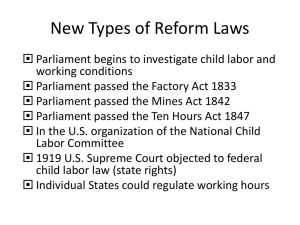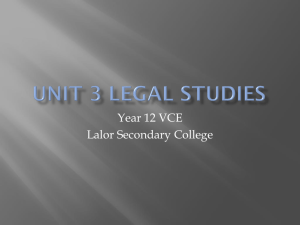Resolutions in one document
advertisement

MEP BSR LEIPZIG 2012 RESOLUTIONS The Committee on Foreign Affairs submits the following resolution to the Model European Parliament Leipzig. Resolution about the question of how the EU should handle international conflicts in the new Arab “democracies”, e.g. Egypt, Syria. To what extent should/could the EU intervene in social and political processes in the region? The Model European Parliament Leipzig, A. Fully alarmed by governments manipulating media, which in turn could result in the lack of unbiased information, B. Recognizing the suppression of oppositions and non-existing political diversity, C. Concerned by the possibility that new Arab “democracies” could accept a new judicial system with extremist laws that go against human rights, D. Deeply disturbed about the killing of innocent citizens and governments constantly violating the international laws of war, E. Deeply concerned by the fact that the tripartite system of power is and will continue to be concentrated by one power, F. Alarmed by the fact that almost no humanitarian aid is offered and distributed in the boundaries of the needing countries, G. Taking note of the many refugees forced to leave from Arab countries affected by a civil war or a rebellion, 1. Encourages independent media organizations to publicize legitimate information about ongoing affairs with e.g. blogs and news sites on the Internet1; 2. Supports the NGO Freedom House, which helps to organize fair elections; 3. Calls for a project for founding new political communities which could, for instance,: i. Offer safe meeting places; ii. Advertise the project; iii. Send experts on specific topics; iv. Give information material; 4. Further reminds the governments concerned to respect the human rights; 1 Accessed by proxy servers if nessesary 5. Supports financing independent organisations in order to inform the citizens of the supressed countries about human rights, e.g. Amnesty International; 6. Further reminds the International Court of Justice that all kinds of war crimes and crimes against humanity are important and punishable in order for justice to be made; 7. Appeals to the neighbouring countries and considers co-operating with them in order to close their borders to hostile leaders committing war crimes; 8. Urges the new democratic Arab countries to establish their tripartite systems and offers the EU’s guidance and expertise; 9. Suggests organising financial aid to reform the regime into a tripartite system; 10. Resolves to give financial support to local and international non-governmental humanitarian aid organizations; 11. Encourages the UN to protect the deployed helpers of the non-governmental humanitarian aid organizations in the critical countries; 12. Calls upon countries to accept a treaty, which would simplify the work of non-governmental humanitarian aid organizations e.g. by giving conditional visas to their workers; 13. Supports subsidising refugee camps and sending humanitarian aid to the countries concerned and their neighbour countries; 14. Instructs the President of the GA to forward the resolution to the European Parliament, the European Commission and the Council of Ministers. The Committee on Employment and Social Affairs submits the following resolution to the Model European Parliament Leipzig. Resolution about the question of youth unemployment. The Model European Parliament Leipzig; H. Recognizing the increasing rate of youth unemployment as a result of the economic crisis and the new labour market situation, I. Deeply concerned about the lack of gaining work experience or practical experience during educational years, J. Alarmed by the poor linkage between the educational system and the labour market caused by the lack of communication and information, K. Taking note that incentives of getting a job in another country are low due to unattractiveness of geographical mobility, L. Bearing in mind that the possibilities of entering foreign labour markets are too difficult. 1. Requests better statistics on showing where free jobs will be in the near future; 2. Trusts the Committee on Economic and Monetary Affairs to work further against the consequences of the economic crisis on the labor market; 3. Further requests at least two different internships with a minimum length of two weeks before high school graduation; 4. Recommends EU member states to implement mentor systems making it possible for companies to offer more experienced employees who educate and advice apprentices; 5. Supports giving tax privileges to companies employing young people2 or implementing internships; the amount of tax privileges will be i. defined by the quantity of internships created and the amount of young people employed; ii. 2 people aged between 15 and 29 years based on the size of the cooperating business; 6. Calls upon the need of creating a European institution called European Labour Centre (ELC) which will serve as: i. European wide job search centre; ii. a channel of communication and cooperation between the existing employment agencies within the European Union; 7. Approves that the aforementioned institution will be appointed the tasks of i. informing students in schools and universities through projects; ii. promoting working in other EU member states; iii. encouraging companies to employ young people; iv. fighting and clarifying bureaucratic obstacles; 8. Further requests informative and educational workshops to be carried out by employment agencies and recruiting companies in the last year of mandatory school and additionally, in high school; 9. Endorses the expansion of scholarships and the process of applying for scholarships or other financial support to be made easier by improving the information standards; 10. Reminds to keep the language tuition on a level that is sufficient to ensure young people’s preparedness to adapt to foreign circumstances; 11. Emphasizes the cross-border cooperation between universities and companies in the EU member states to promote a job in the companies’ country; 12. Encourages schools to promote already existing student exchange projects3 within the European Union and for these to expand; 13. Regrets a lack of comparison on academic level between graduates from different EU member states and asks the committee on culture and education to solve this issue; 14. Instructs the President of the GA to forward the resolution to the European Parliament, the European Commission and the Council of Ministers. 3 such as Erasmus, Leonardo Da Vinci and Comenius The Committee on Regional Development submits the following resolution to the Model European Parliament Leipzig. Resolution about the question of what role regions and local authorities can/should play in the EU. How should the tendency to establish legal entities/regions inside or outside the nation state be looked upon and handled? The Model European Parliament Leipzig, A. Deeply concerned about separatist movements in several EU member states, B. Keeping in mind that the mission of the EU is to minimize gaps in the EU and bring European countries closer to each other, C. Taking note of the underrepresentation of regions in the EU, D. Realizing that many regions’ local authorities lack the knowledge of how they can receive financial support from the EU, E. Worried about the financial support to regions who are investing it inefficiently; F. Observing that regions that have extensive autonomy are not experiencing a separatist outburst, G. Alarmed about the absence of laws concerning potential EU membership for prospective states seceding from an EU member state, 1. Encourages countries to revise the way that they deal with problems such as gaps of living standards between different regions by further interregional meetings and discussions; 2. Urges the importance of further meetings and discussions with the Committee of Regions in order to highlight the voice and interest of the regions in the EU and to understand problems specific to them; 3. Requests the European Bank for Reconstruction and Development to organize: a.) conferences that gather local authorities and inform them about their possibilities of how to get support from EU regional financial aid; b.) a multimedia campaign to inform EU citizens about the regional support that the EU offers; 4. Strongly recommends the forming of a nongovernmental organisation that sends experts to large investment organisers: a.) to check if the planned budget is realistic; b.) who have to focus on specific historical, economic, political and demographic matters, to avoid inefficient and unequal investment; 5. Expresses its hope for compromises on the main issues that separatist regions advocate; 6. Calls for the creation of regulations on how a secession would happen, saying that: a.) every seceded state needs to join the back of the application line to fulfil the Copenhagen Criteria; b.) seceded states do not inherit the opt-out for the euro; c.) these states are given the opportunity to join the European Single Market although they are not part of the EU. 7. Instructs the President of the GA to forward the resolution to the European Parliament, the European Commission and the Council of Ministers. The Committee on Culture and Education submits the following resolution to the Model European Parliament Leipzig. Resolution about the question of the role of social media – the new social media play an increasing part in education and in the society. How should they be dealt with – as a democratic advantage or disadvantage for young people? A. Emphasizes the disability to control the data on the internet by the user, B. Bearing in mind that restrictions should only exist if they belong to illegal activity4, C. Believes that recruiting new members to groups of organized crime and their activities are easier through social media, D. Recognizes the lack of knowledge among young people, when it comes to criticism of sources, E. Alarmed by the decreasing amount of privacy, F. Convinced of the advantage for participating in the EU through social media, G. Keeping in mind that the freedom of expressing opinions is indispensable for the social media, 1. Supports and forms projects with a focus on providing teachers and students with a deeper knowledge about social media and criticism of sources; 2. Recommends MEPs to get in contact with citizens through social media; 3. Calls upon a development for a seal of quality given by a committee for trustful social media websites; 4. Declares that the standard setting for privacy in social media should be “friends only” 5. Asks for stronger and coherent data protection rules; 6. Further recommends international cooperation in order to prevent all illegal acts; 7. Suggests the institutions of the EU to make more activities that engage the youth; 8. Accepts that censorship might be useful but only in case of certain websites1; 9. Declares that providers of social media services cannot be held responsible for the actions of the user, unless the providers are actively aiding and abetting the user; 4 for example: child pornography, racism, copyright problems, organisation of crime 10. Encourages legal institutions to focus more on social media to stop illegal activities and communicate with people; 11. Underlines the importance of social media as an instrument and dialogue between organisations, genders and various cultural- and ethnic groups; 12. Further proclaims that freedom of speech is one of the highest aims on social media; 13. Considers the setting up of projects, which apply to e-democracy in the EU; 14. Supports educational actions that draw attention to the privacy issue on social media; 15. Instructs the President of the GA to forward the resolution to the European Parliament, the European Commission and the Council of Ministers. The Committee on Women´s Rights and Gender Equality submits the following resolution to the Model European Parliament Leipzig. Resolution about the question of how to deal with trafficking in human beings – large numbers of people are smuggled into the EU by traffickers. Some end up in prostitution, forced labour, human organ trade and illegal adoption. What can be done to fight this development? A. Alarmed by i. the lack of data regarding human trafficking such as forced prostitution and labour, black market organ trade and illegal adoption due to the silence and insecurity of the victims ii. the fact that the majority of the prosecuted traffickers is not convicted; B. Fully aware that poverty is a main cause of human trafficking combined with the lack of i. education including knowledge about rights, e.g. human rights ii. information about human trafficking; C. Observing the lack of cooperation, both within EU-member states, between the EU and third countries and between the EU and NGO’s5; D. Concerned about the lack of help for victims of human trafficking in the current legislation; E. Convinced that the different legislations within the EU-member states cause problems regarding locating and prosecuting traffickers; 1. Proclaims the expenditure of the Europol section focusing on human trafficking, which i. controls and coordinates national police forces ii. receives increased financial support, 2. Emphasizes the need to further improve cooperation between NGO’s, Europol, the European Parliament and national governments, including enlarging the database that the above mentioned organizations will have access to, 3. Supports the existing NGO’s financially to further expand their efforts to prevent trafficking of human beings, 4. Authorizes the establishment of an EU unit with the purpose of cooperating with the existing NGO’s; i. 5 to create information material for schools about human rights and human trafficking Non Government Organisation ii. to improve and expand campaigns for public information, 5. Strongly recommends schools within the EU to include the topic of human rights and human trafficking in the education of their students as an interactive learning programme, and strongly encourages third country schools to use material produced accordingly, 6. Supports the Europol with financial means that are distributed between the EU national police forces according to necessity, regarding the investigation of illegal prostitution, forced labour, black market organ trade and illegal adoption, 7. Calls upon an increased number of check-ups by the national police forces regarding prostitution connected to human trafficking in countries where prostitution is legal, 8. Urges the national police forces to improve and make check-ups more frequently i. in exposed businesses such as manual labour, to reduce forced labour ii. in private clinics to tackle black market organ trade, 9. Calls upon raising awareness regarding illegal adoption in hospitals, schools and local authorities, 10. Urges Frontex6 to further implement education and awareness of customs and border security staff, to identify victims of human trafficking, 11. Proclaims the foundation of an EU-agency that controls and coordinates national rehabilitation centres, 12. Further proclaims that national rehabilitation centres improve the organisation of the rehabilitation of the victims by expanding their cooperation with clinics and the police, according to the guidelines of the EU-agency, 13. Permits the victims from third countries to stay up to three months without residence permits in the country they were trafficked to, while the victims have 30 days according to the current legislation, to decide whether or not to testify, 14. Reminds schools to have career counselling sessions for students to improve the awareness of their perspectives, 15. Reaffirms the EU strategy towards the Eradication of Trafficking in Human Beings 2012-2016, and the Directives 2011/36/EU and the Stockholm Programme, 16. Instructs the President of the GA to forward the resolution to the European Parliament, the European Commission and the Council of Ministers. 6 Organisation controlling the borderlines of the European Union








